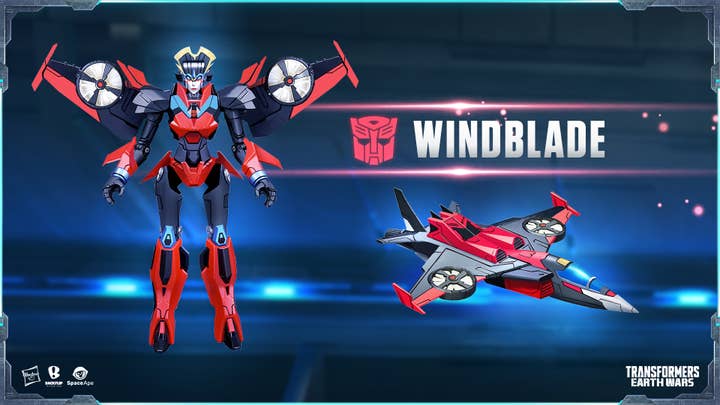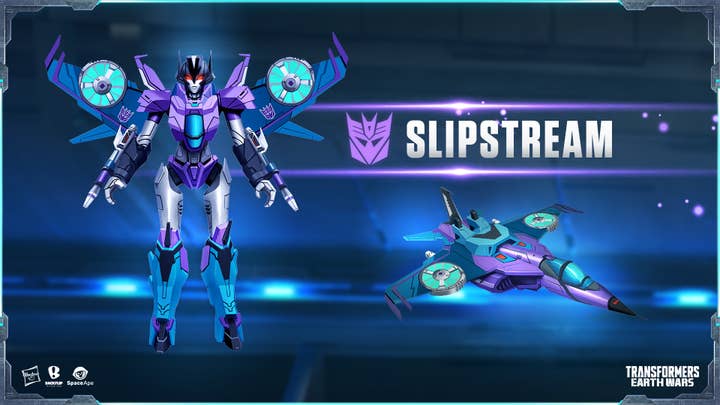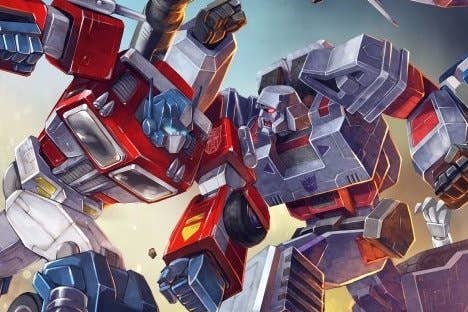"Console games can be for Christmas, but free-to-play is for life"
As Space Ape partners with Hasbro for Transformers, the management talk commitment
Space Ape is one of London's big mobile success stories, showing consistent growth and a healthy attitude towards the foundation of a genuinely sustainable industry in the nation's capital. Co-founded in 2012 by Californian John Earner and Australian Simon Hade, the firm has made no bones about choosing the UK as a base of operations thanks to the extensive pool of international talent available there.
The studio has, so far, made its name as something of a specialist in what its founders call 'build and battlers', the mid-core asynchronous multiplayer genre established to such great success by Supercell and Clash of Clans. It's already had two successes in the genre: Samurai Siege and Rival Kingdoms, but now Earner and Hade are looking to take the next step with the attachment of a globally recognised IP in the shifting shape of Hasbro's Transformers for its new game Earth Wars.
"I guess you could say it's the modern take on classic Transformers, where the characters are bigger, chunkier and more colourful, rather than the [Michael] Bay-style, which uses more organic characters," says product owner Chris White when I ask if they're tying Earth Wars to the Bay-directed films. "It works very well for us because they're very readable when they're small."
"So Hasbro and Backflip approached us and asked if we'd like to make it. We thought about it for about three seconds and said, 'yes, absolutely.'"
"The brand is obviously a really big deal for Hasbro," adds Hade. "It was pretty obvious that this is a genre where that brand would work really well. Hasbro was smart enough to realise that these are pretty hard games to make, because there's a lot going on under the hood, so they approached us. At the time we had Samurai Siege doing really well and we also had Rival Kingdoms just entering beta.
"So Hasbro and Backflip (the mobile publisher in which Hasbro is a majority stakeholder) approached us and asked if we'd like to make it. We thought about it for about three seconds and said, 'yes, absolutely.' It was a huge opportunity - it's a perfect match between genre and IP and we could bring a lot to the table."
"We are targeting people who were big console players back in the day," adds White. "They have less time to play now but they still want something more involved than just matching shapes."
It is, by their own admission, a game which sits firmly within the established boundaries of the genre, but with twists unique to the licence. Space Ape were approached by Hasbro and Backflip precisely because Samurai Siege and Rival Kingdoms had proven that they knew what they were doing, so moving too far away from the established template didn't make much sense. Nonetheless, the team sees a few avenues for legitimate innovation, whilst factoring in the idea that their audience isn't necessarily likely to be Clash of Clans veterans.

"Talking to a lot of the Transformer fans we have over the course of development, it's amazing how many of them haven't played any games in this genre before," says White. "Whereas you'd expect everyone to have played Clash of Clans, they actually haven't, so we're introducing them to the genre for the first time. One really interesting thing we saw during development, when we were getting Transformers fans in, is that, as a developer you've obviously seen a lot of games, a lot of tutorials. You start to think that everyone must know how this works, that you need to teach the player something different. Actually, there's tons of Transformers fans out there that don't know the mechanics of the genre, or indeed any game.
"It's easy to be cynical, having played tons of games in the genre and developed a few of them, but then you realise that maybe in some areas you've actually gone a little too far with the innovation and you need to dial it back a bit and give people something they're more familiar with."
"I think it's still a really vibrant genre," says Earner. "We made a big change in the way which we make games in between Samurai Siege and Rival Kingdoms: we know that players aren't content to play the same games again and again. There need to be fundamental differences.
"That's not to say there can't be similarities - games are generally built on the shoulders of other great games."
"That's not to say there can't be similarities - games are generally built on the shoulders of other great games. With both Rival Kingdoms and now Transformers, we think we've done a number of things differently to any other game in the genre. We've got heroes rather than mindless troops for one thing, which gives us tremendous scope for storytelling."
Monetisation is going to be handled slightly differently, too, by abandoning a lot of the environmental upgrades which formed the basis of Samurai and Kingdoms, as well as moving away from strict upgrade trees to allow players to build a team of their favourite robots. White says they're steering clear of cynical micro-payments, but there's also an awareness that the pre-built fandom and demographic bracket of their audience is likely to yield a decent ARPU.
The other side of that equation, the user acquisition, looks to be in good hands too, with Hasbro and Backflip taking on a lot of the heavy lifting with marketing.
"It's a partnership," says Earner when I ask about the division of labour. "Of course, it's true - from their perspective it's their crown jewel brand, they've invested heavily in mobile, they're big believers in the platform and as you say they have a lot of tools in their chest that we will never have. On the flipside...when it comes to free-to-play, marketing and product development can no longer be considered as distinct functions.

"One of the biggest differences between mobile free-to-play developers and more traditional studios is whether those two functions are integrated. Using the product to distribute itself - having the people who did the art for the game also do the art for the ads, using the data we get from the game to decide who we reach out to, it's a team effort. So we've gotten very good at a particular type of marketing over the last few years - performance based marketing using some of the biggest channels, like Facebook. Hasbro and Backflip have their own special skills, too. Backflip created the highest grossing game in 2011, they've got more capital than us, so they're more skilled in certain channels like video. Hasbro complete the triad - they really know how to do above the line marketing, to create awareness of something in advance of it going live.
"I think between the three of us we create a really powerful message about the game and get it out there."
Tentatively, I point out that Transformers as a brand hasn't always translated brilliantly to games, that there's a considerable portion of the centre portion of that Venn diagram who have been burned by their previous experiences. There's a guardedness to their answer which seems to come from an unwillingness to cast aspersions rather than evasiveness, but they're happy to address the broader issue of the quality of licensed tie-ins as a whole.
"I think the movie game tie-ins that categorised the later generation of console development don't really work for mobile," says Hade. "You can't have thoe external dependencies driving the game so rigidly. You get some examples of studios that can build a franchise and turn out sequels regularly, but for the most part a good studio wants to ship a game when it's ready. So you want to pick an IP and a strategy that work together, where you can take advantage of the fact that your game is going to be recognised and downloaded by a lot of people because it's a Transformers game, but you also want to add to the brand, bring something new to it. At the same time you don't to have to tie yourself to a movie release or an E3 announcement. I don't think that model will be what defines IP games on mobile in the way that it did on console.
"In another sense, console games can be for Christmas, but a free-to-play game is for life. It's like a soap opera that unfolds over several years with updated features"
"In another sense, console games can be for Christmas, but a free-to-play game is for life. It's like a soap opera that unfolds over several years with updated features. We'll be making the game for many years after it has released. We need to have a good relationship."
We chat about the various markets for the game for a while, and I'm surprised to learn that China represents Space Ape's second largest audience, behind the US. Transformers is a global brand, but I've always (mistakenly) seen it as a Western phenomenon - are there plans to take Earth Wars to the Eastern mobile market?
"Transformers is huge in Asia," Earner corrects me. "We have the rights to launch the game globally, we secured the rights via Takara to introduce the game to Japan, which is the only territory where Hasbro doesn't have the rights, but there's a long and productive relationship between the two. So it's not so much that we don't have plans for Asia, it's that Asia requires an extra amount of detail. We won't go live in those countries on day one because we want to put real time into it.
"A pleasant surprise for me, having spent a week in China last year: we always knew that China had become excited about what we call 'Bay-led' Transformers. Bay-led is a country or person whose introduction to the brand comes from the recent films. France is Bay-led, believe it or not, as is China. We suspected that, as a result they might not recognise some of the characters, such as Grimlock. But the mid-core player on the coast of China is also male, 28-45. They know this stuff and they love it, so we're extremely optimistic about it, but like you say, they're a different market, you can't just come at it straight."
"I think the great thing about London is that people import themselves into this market from all over the world...I think gaming is seen as more of a respectable standalone industry here than it is in California"
"We have four Chinese native speakers, two Japanese native speakers," adds Hade. "We really go the extra mile to make it authentic. We draw the line at having different features, but we put a lot of care into the presentation."
Hade and Earner might have global plans, but the future of the company's physical form remains resolutely British. I ask whether Earner stands by his earlier assertion that the UK's capital is the best place for a mobile firm to be doing business. His response is emphatic.
"Even more so now, absolutely. I think a couple of years ago we would have expected that, right about now, being at 100 employees, to have now peaked out on top level talent, to have to be looking elsewhere for it, but that's absolutely not the case. The last few engineers we've hired in the last couple of months have been every bit as good as the founding team. Sometimes they're British, sometimes they're not, but I think the great thing about London is that people import themselves into this market from all over the world.
"That's driven by a lot of things, but the perception is that London is increasingly seen as the capital of the world. You see more Americans here, more Chinese, people from the Commonwealth, more everybody. That does a lot of the work for us. That talent is there in California, but the average tenure is around 14 months. They're going to go to Snapchat, to Google, to Facebook. I think gaming is seen as more of a respectable standalone industry here than it is in California."









